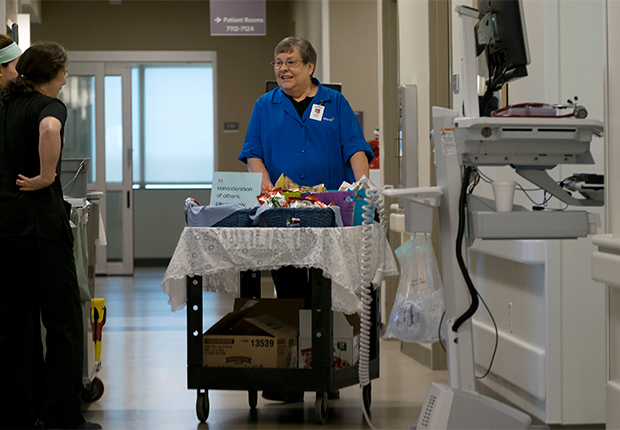AARP Hearing Center

By Tim Poor
As a registered nurse who worked at a hospital for 22 years, Sandy Williams knows the importance of information for those who are responsible for caring for relatives discharged from the hospital. Often, she said, that information is lacking.
“If you have a personal caregiver like a family member or a neighbor, they don’t know what they’re supposed to do,” said Williams, 71, of Joplin. “Those people need to know.”
AARP Missouri is supporting legislation in the upcoming session of the General Assembly to get that information to caregivers. The Caregiver Advise, Record, Enable (CARE) Act would require hospitals to:
- Record the name of the caregiver when a patient is admitted.
- Notify the caregiver when the patient is to be discharged or transferred to another facility.
- Instruct the caregiver about medical tasks—such as medication management, injections or wound care—that he or she will perform at home.
“It’s a bill that would really empower consumers and caregivers with the information they need to help their loved one who is transitioning out of the hospital,” said Brian Colby, 50, an AARP volunteer from Kansas City and a health policy consultant. “This allows for the patient to choose who they want the caregiver to be.”
He added that the legislation would benefit hospitals by reducing unnecessary readmissions. Since 2012, hospitals face reduced Medicare and Medicaid payments if they have “excess readmissions.”
The measure was introduced this year, but last-minute snags over wording scuttled it. Colby said he is lining up sponsors for the session that begins Jan. 4 and is optimistic it will pass. “It’s relatively uncontroversial,” he said.
Changes are sought
The Missouri Hospital Association, representing 148 hospitals, is not taking a formal position on the CARE Act but is working to improve it, said spokesman Dave Dillon.
He said hospitals want the bill’s requirements to also apply to facilities such as ambulatory surgical centers that perform medical procedures such as hip replacements. “We want the standard to be one that is across the entire provider community,” he said.
Dillon also said the requirements should be streamlined so that hospitals do not have to instruct multiple caregivers, which he said could be “onerous.”
Rep. Jeremy LaFaver (D-Kansas City), a sponsor, said the bill “just seemed like it made an awful lot of sense. Patients need to have somebody who’s aware of their care plan and can help them get back on their feet.”
Jay Hardenbrook, associate state director for AARP Missouri, said passage of the CARE Act will again be a priority for AARP. He noted that more than 30 states have passed similar legislation. “I think we’ll have a pretty good chance of moving it forward next year.”
Jinny Hopp, 71, of Carthage, hopes so. She is an AARP volunteer who runs a caregiver support group.
“The number one thing that people feel they don’t know enough about is how to assist with the medical requirements,” she said. “They’re asked to do it all. Most of us have no preparation for doing those tasks.”
She said the CARE Act is especially important for people who are caring for relatives who cannot afford to hire paid caregivers.
“We need more instructions about what to do, what warning signs to look for, a person to call to ask questions,” Hopp said, adding that the family doctor often does not have the information.
“I hope something can happen this year,” she said.
Tim Poor is a writer living in Clayton, MO.































































